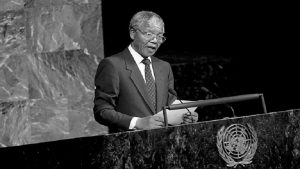Renowned epidemiologist, Professor Salim Abdool Karim, has sought to explain the reasons behind the World Health Organisation (WHO) declaring monkeypox a global health emergency, saying an internationally coordinated response is necessary.
Over 16 000 cases have been reported in 75 countries and there have been five monkeypox-related deaths – all of which were in Africa. Three infections have been reported in South Africa so far.
Karim has reminded the public not to panic.
“Those who have indicated they have it, we don’t need to be that concerned, but on the flip side there are over 70 countries that have never had monkeypox before where monkeypox is being reported and there is local spread. That is deeply concerning. So, even though there are only five deaths reported, it is not a disease that we need to be panicked about but it is a disease that needs some kind of internationally coordinated response,” says Karim.
WHO declares monkeypox a global health emergency:
Health Department on high alert after WHO declares monkeypox a global emergency
The Department of Health in South Africa says it remains on high alert following the announcement by the World Health Organisation (WHO) that the ongoing monkeypox outbreak has been declared a ‘Public Health Emergency of International Concern’.
This is the highest alarm WHO can sound.
Chief Director for Primary Healthcare at the National Health Department, Ramphelane Morewane says the country is ready to mobilise COVID-19 resources if an outbreak is declared in the country.
“We are concerned because we are part of the global village. Even though the cases are more concentrated in Europe and the Americas, we are worried because of travel connections through countries. We are not immune,” says Morewane.
“The declaration of the public health emergency of international concern means an increased attention is required because of the speed that the virus is spreading. It allows us to tap into our resources and luckily we have been doing this during COVID-19. We are on alert, we are not dropping our guards, we are on alert,” Morewane reiterates.
“So in short, we have an outbreak that has spread around the world rapidly, through new modes of transmission, about which we understand too little and which meets the criteria in the International Health Regulations.”-@DrTedros #monkeypox
— World Health Organization (WHO) (@WHO) July 23, 2022






